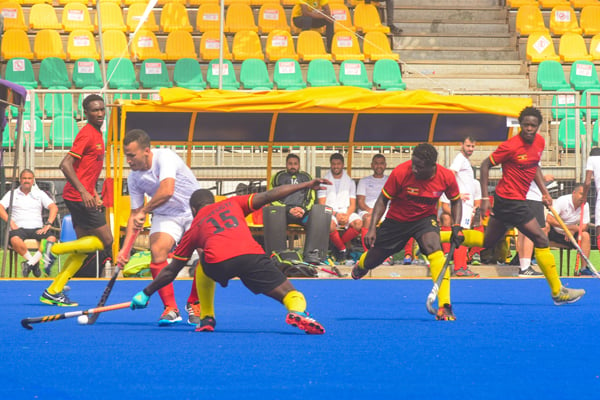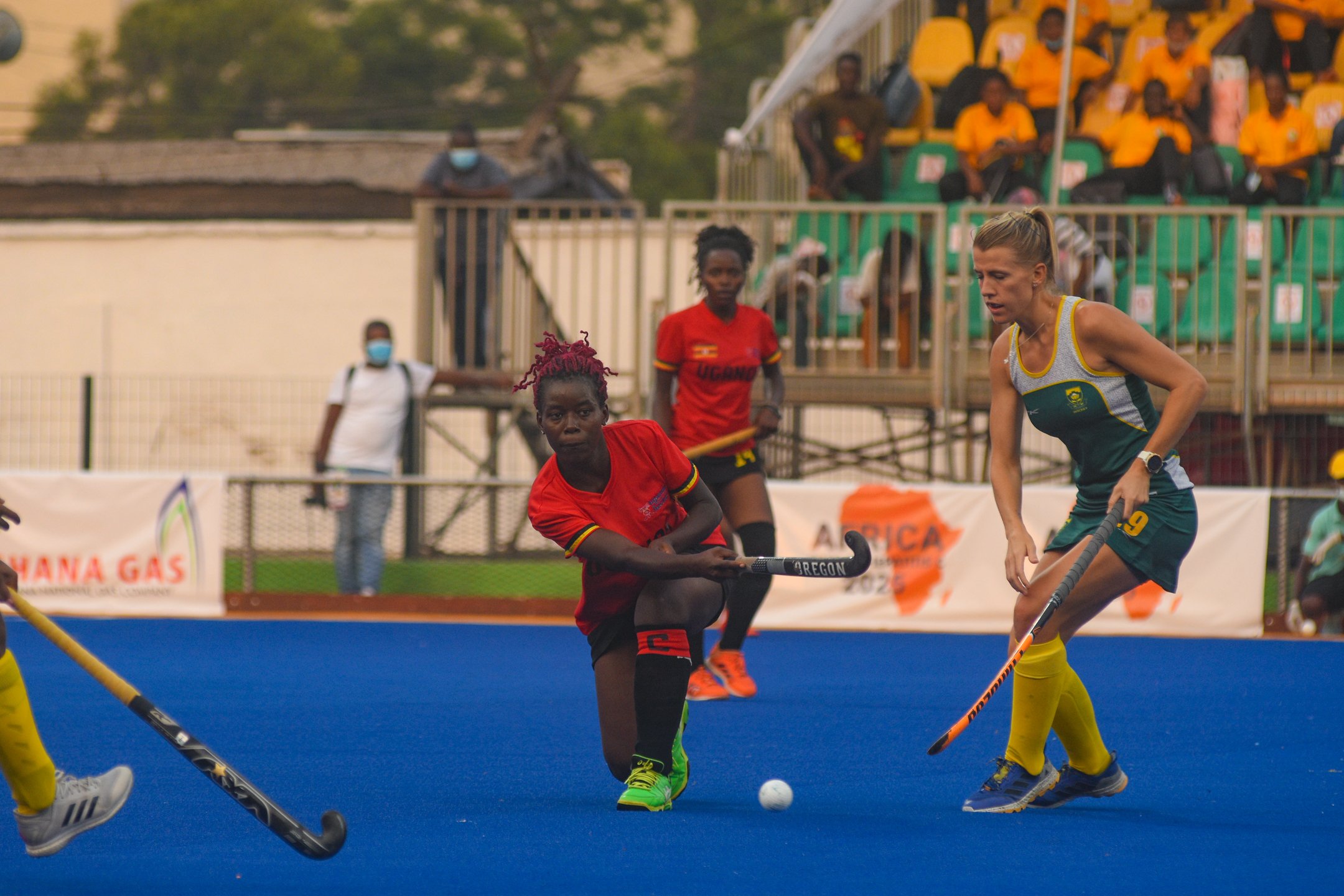Uganda hockey hope Afcon was not another false start

Promising. Uganda got a taste of what the big stage can be like with the men’s team managing a win against Namibia. But Lucky Akello (right) was not lucky with the women’s team as they struggled for in all matches. PHOTO / MAKHTUM MUZIRANSA
What you need to know:
- A process. Uganda cannot be faulted for lack of effort but the results in Ghana showed how brutal this stage can be to regular absentees.
Uganda’s 3-1 pool B loss to Egypt at the January 17-23 Africa Cup of Nations (Afcon) in Ghana, revoked memories of the 15-0 loss to the north Africans at this stage in 2000 in Bulawayo.
Current Uganda Hockey Association (UHA) president Phillip Wafula was a player on the national team then.
“We had not been at Afcon since 1974 so whenever they scored, they teased that we shall take even longer to return,” Wafula shared.
From then, generations of players wasted away as Uganda took another 22 years – mostly because of the association’s financial constraints - to return.
In between, there was a lone appearance at the 2007 Africa Olympic qualifiers in Nairobi but trips beyond East Africa proved impossible to pull off for UHA.
Uganda cannot be faulted for lack of effort but the results in Ghana showed how brutal this stage can be to regular absentees.
Men
As the unknown quantity, the men got off to a commendable 1-1 draw with third ranked Ghana.
The dressing room celebrations were criticized by many fans back home as premature. But it was deploying the same gang-ho attacking tactics that led to the 10-3 hiding from Nigeria despite scoring first and not “players feeling they had arrived” as they were accused by some.
Coach Vincent Kasasa’s side did not only show naivety but also a lack of acknowledgement of the strides that teams which have regularly participated over the years have made.
The players quickly asked for Francesco Richichi, who had initially been appointed as head coach for both men and women but relegated to an advisor for the men’s team as he had missed many training sessions while away in Italy, to have more influence.
The defensive show against Egypt was better and Uganda also registered its first win (3-2) – albeit nervy – of the tournament against Namibia in the classification games before falling 6-1 to Ghana.
Using the bench
The coaches have to shoulder some responsibility for the players’ loss of motivation as they struggled to keep the dressing rooms happy. Watching eventual men and women’s champions South Africa and men’s runners-up Egypt, their coaches selected 18 players that they fully trusted and involved all through running substitutions.
Uganda did well to switch the first 11s in every game but there was no strategy on how to utilize the bench for impact or to rest players.
Martin Okello, Richard Ssemwogerere, Richard Kaijuka and especially Peter Walusansa were under-utilized and missed games. Pauline Achom and Aisha Kagere too for the women.
Women neither here nor there
The debuting women’s team deployed heavily at the back without much to show for it.
Right-back Lamula Nakajjumba was a major positive as she settled seamlessly into her first defensive job.
Uganda was also solid at defending short corners especially against Zimbabwe, which they limited to one conversion out of 12 attempts.
But playing the over elaborate Norah Alum and Teopista Anyango, usually attackers for their club Wananchi, deeper in midfield – and for the latter also as a left-back at times – gave mixed results.
They were decent in possession but the defence still remained exposed yet the attack could have done their ingenuity.
Also more teamwork was expected as half the squad came from Wananchi which is so dominant at home. But there were moments when you felt they were stunned by being on the receiving end of heavy defeats.
Eventually, Uganda conceded 24 goals and scored just once through Thuwaibah Kiggundu to finish last in the women’s category.
“We need a deep pool of players to first of all increase the competition for national team slots.
But also to ensure that we take 18 players of top quality,” Nsereko, who fielded a team of average age 22, said.
Umpires
Meanwhile, Uganda’s biggest positives came from the technical officials’ side where umpires and namesakes Stanley and Kenneth Tamale took charge of the highly charged men (Nigeria and Kenya) and women’s (Zimbabwe and Kenya) bronze medal matches respectively.
Kenneth was also involved in the pulsating semi-final between Zimbabwe and hosts Ghana that the latter won with a last second penalty corner awarded by the Ugandan umpire.
George Ntegeka also ran both the men’s (South Africa and Egypt) and women’s ((South Africa and Ghana) finals from the table – confirming the progress Uganda’s technical officials made throughout the tournament.
NCS have faith in hockey
Fortunately for UHA, their prime benefactors National Council of Sports (NCS) feel the show in Ghana is one that can be built on.
“The ladies did not make a strong statement but that is understandable because this was the first international exposure for them.
The men showed some maturity in holding Ghana in their own backyard. I think this is a sport, we need to keep funding.
I know that we did not fund the team well and on time but we make a promise to clear all remaining dues like player allowances and a few participation concerns as and when we receive money,” NCS general secretary Patrick Bernard Ogwel, said in a statement that should be a music to Wafula’s ears as he eyes to host the All Africa Games qualifiers in April.
Hosting, according to Wafula, will require an investment of about Shs100m from UHA which is about five times less than what they needed to take the team to Ghana.




